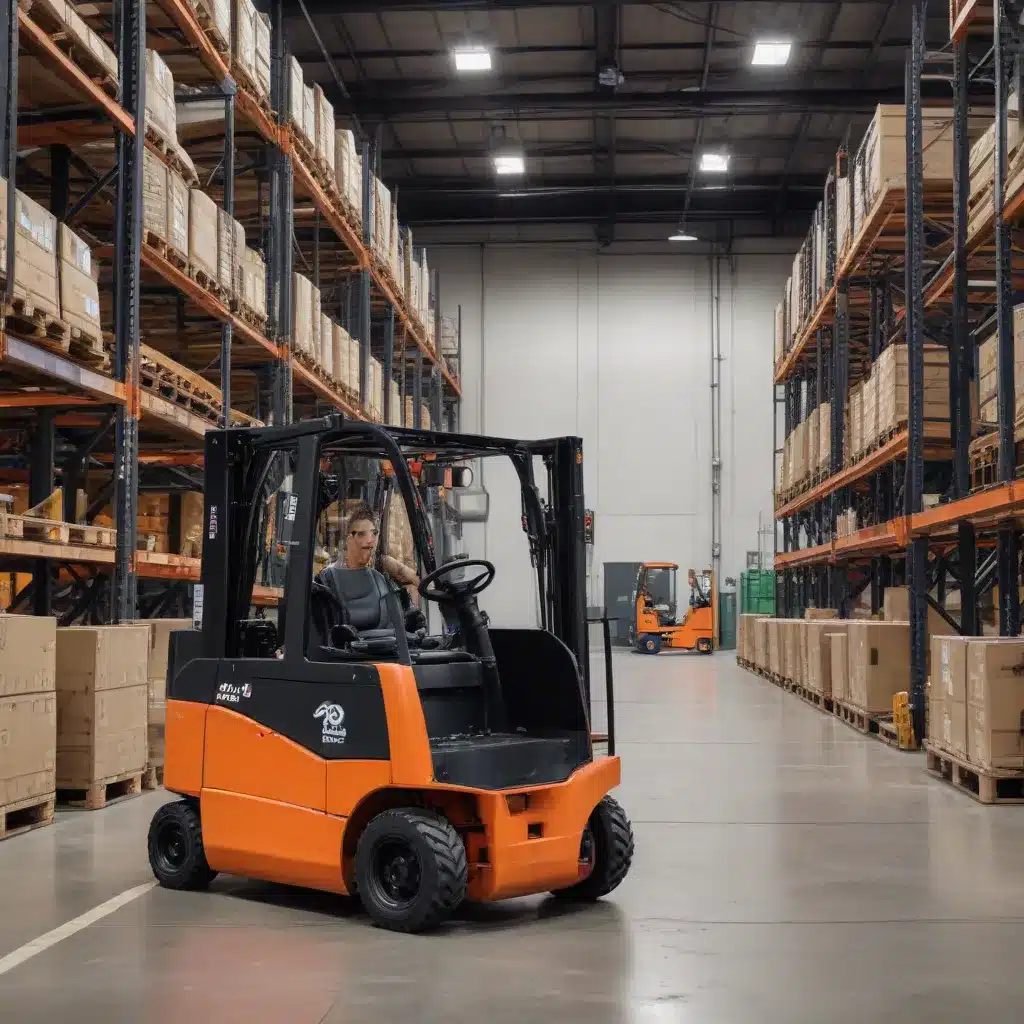
The Evolution of Forklift Maintenance in the Digital Age
The forklift industry has undergone a remarkable transformation in recent years, transitioning from traditional maintenance practices to a connected, data-driven ecosystem powered by the principles of Industry 4.0. As the world becomes increasingly digitized, forklift operators and fleet managers now have access to a wealth of real-time data and innovative technologies that are revolutionizing the way they approach forklift maintenance and operations.
Embracing the Connected Forklift: Leveraging Sensor Data for Predictive Maintenance
One of the key drivers of this evolution is the growing adoption of connected forklift technologies. Forklifts are now equipped with a vast network of sensors that continuously monitor a range of critical parameters, from engine performance and battery life to operating hours and impact events. This data is then transmitted to cloud-based platforms, where it can be analyzed using advanced analytics and machine learning algorithms to predict potential issues before they occur.
As highlighted by Airbus Helicopters, this shift towards predictive maintenance has significant benefits for forklift operators. By anticipating maintenance needs, they can schedule servicing more efficiently, reduce unplanned downtime, and ensure their fleet is operating at optimal performance. Additionally, the ability to access historical data and trends allows for more informed decision-making, enabling fleet managers to make proactive adjustments to maintenance schedules, spare parts inventory, and overall asset management strategies.
Harnessing the Power of Industry 4.0: Integrating Forklift Data into the Connected Enterprise
The transition to a connected and data-driven forklift ecosystem is a key component of the broader Industry 4.0 movement. By integrating forklift data into the connected enterprise, organizations can unlock even greater efficiencies and insights. As Rockwell Automation’s experts explain, this convergence of operational technology (OT) and information technology (IT) allows for seamless data flow, enabling real-time decision-making, optimized workflows, and enhanced supply chain visibility.
For example, forklift utilization data can be combined with warehouse management systems to improve inventory tracking, streamline material handling processes, and identify opportunities for productivity gains. Furthermore, the integration of forklift maintenance data with enterprise-level asset management systems can provide a holistic view of the organization’s equipment health, facilitating more informed capital expenditure decisions and proactive maintenance planning.
Navigating the Challenges of Connectivity and Cybersecurity
As forklift fleets become increasingly connected, the importance of robust cybersecurity measures cannot be overstated. Ericsson’s insights highlight the need for comprehensive security protocols to protect against potential cyber threats, ensuring the integrity and confidentiality of the data being collected and analyzed.
Forklift fleet operators must work closely with their technology partners to implement robust access controls, data encryption, and network segmentation strategies. Additionally, ongoing employee training and regular system updates are crucial to maintaining a strong cybersecurity posture and safeguarding the connected forklift ecosystem.
Optimizing Forklift Maintenance and Operations Through Data-Driven Insights
The integration of connected technologies and data-driven insights is transforming the way forklift maintenance and operations are managed. By leveraging the power of Industry 4.0, forklift fleet operators can:
-
Enhance Preventive Maintenance: Predictive maintenance algorithms can identify potential issues before they arise, allowing operators to schedule servicing proactively and minimize unplanned downtime.
-
Improve Fleet Utilization: Real-time data on forklift usage, operator behavior, and equipment performance can help fleet managers optimize their asset deployment, reduce idle time, and ensure their fleet is operating at maximum efficiency.
-
Optimize Parts and Inventory Management: By analyzing historical maintenance data and forecasting future needs, organizations can more accurately plan their parts inventory, reducing the risk of stockouts and minimizing carrying costs.
-
Enhance Operator Safety and Training: Forklift sensor data can provide valuable insights into operator behavior, enabling targeted training programs and informing the development of advanced safety features and alerts.
-
Drive Sustainability and Environmental Compliance: Forklift data can help organizations track and monitor their environmental impact, supporting their efforts to reduce emissions, optimize energy consumption, and meet regulatory requirements.
Embracing the Future of Forklift Maintenance: A Roadmap for Success
As the forklift industry continues to evolve, embracing the power of Industry 4.0 and the connected forklift ecosystem will be crucial for organizations seeking to maintain a competitive edge. By leveraging data-driven insights and innovative technologies, forklift fleet operators can streamline their maintenance practices, enhance operational efficiency, and unlock new opportunities for growth and sustainability.
To navigate this transition successfully, forklift fleet operators should consider the following key steps:
-
Assess Current Capabilities and Identify Opportunities: Conduct a thorough evaluation of your existing forklift fleet, maintenance processes, and data management practices to pinpoint areas for improvement and determine the most impactful technological investments.
-
Develop a Comprehensive Connectivity Strategy: Collaborate with technology partners to design and implement a robust connectivity infrastructure that integrates forklift sensors, cloud-based platforms, and enterprise-level systems, ensuring seamless data flow and optimal performance.
-
Implement Predictive Maintenance Protocols: Leverage advanced analytics and machine learning to transform forklift sensor data into actionable insights, enabling proactive maintenance scheduling and reducing the risk of unplanned downtime.
-
Foster a Culture of Data-Driven Decision-Making: Empower your team with the skills and tools necessary to interpret and act upon the insights generated by the connected forklift ecosystem, fostering a data-driven mindset throughout the organization.
-
Prioritize Cybersecurity and Data Governance: Establish comprehensive security measures and data management protocols to protect your connected forklift ecosystem, safeguarding sensitive information and ensuring regulatory compliance.
-
Continuously Optimize and Innovate: Regularly review your forklift maintenance and operations strategies, adapting to emerging technologies and industry trends to maintain a competitive edge and maximize the value of your connected forklift ecosystem.
By embracing the power of Industry 4.0 and the connected forklift ecosystem, forklift fleet operators can position themselves for long-term success, delivering enhanced operational efficiency, improved safety, and greater sustainability – all while providing superior service to their customers.
Explore the Forklift Reviews website to stay up-to-date on the latest forklift industry trends, safety guidelines, and maintenance best practices, and discover how you can leverage the power of connectivity and data-driven insights to transform your forklift operations.

